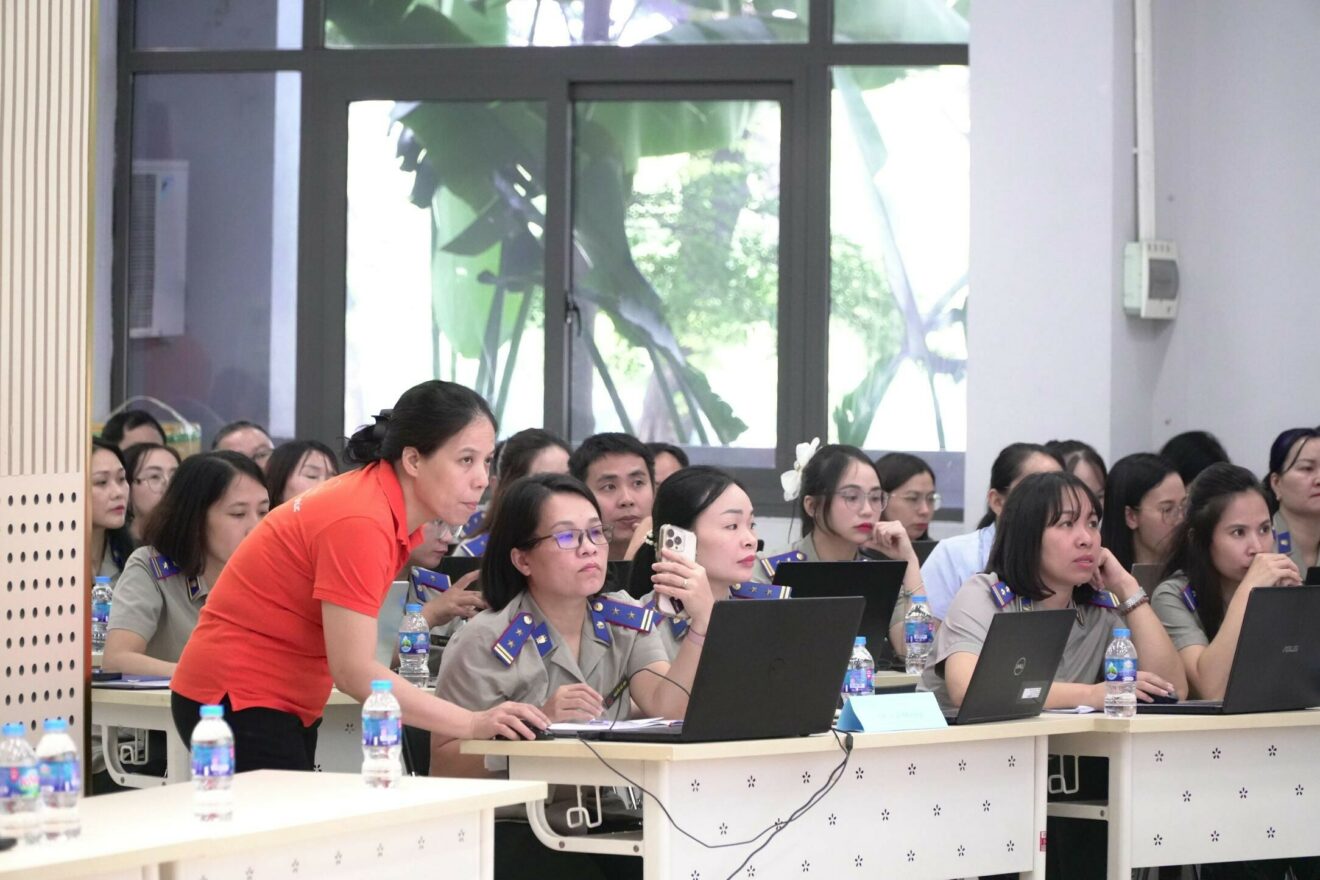FPT and FPT Polytechnic jointly organize advanced training on the 2025 Civil Judgment Enforcement System for the Ministry of Justice
Recently, FPT, in collaboration with FPT Polytechnic College and the General Department of Civil Judgement Enforcement (THADS) under the Ministry of Justice, hosted an advanced training session titled “Digital Platforms for Civil Judgment Enforcement: Electronic Receipt System, Judgment Enforcement Decision Support Software, and Digital Signatures” at the E Hall of FPT Polytechnic College. The program welcomed nearly 120 officers from 34 Civil Judgment Enforcement agencies nationwide.
In his opening remarks, Mr. Vu Chi Thanh, Rector of FPT Polytechnic College, reaffirmed FPT’s commitment to working alongside the Government in implementing Resolution 57-NQ/TW and accelerating comprehensive digital transformation across state agencies. He emphasized that the college’s collaboration with FPT in organizing this training not only reflects the responsibility of FPT’s education sector in advancing public administration reform, but also underscores the serious, coordinated engagement of the entire FPT ecosystem in the nation’s digital transformation journey.
Mr. Vu Chi Thanh, Rector of FPT Polytechnic College
Representing the Ministry of Justice, Mr. Pham Thanh Trung, Head of Digital Transformation & Data Statistics for Judgment Enforcement at the General Department of Civil Judgement Enforcement, stated: “In line with the Government’s policy to accelerate the application of information technology and digital transformation in state agencies, the Civil Judgment Enforcement system has, in recent years, continuously innovated and gradually adopted IT and digital technologies to improve management and operational efficiency in serving citizens and businesses. The Ministry of Justice has directed the implementation of several key software solutions to support professional operations, such as the electronic receipt system, the judgment enforcement decision support software, and the increased use of digital signatures. These applications have helped enhance transparency, reduce time and costs, and strengthen safety and security within the Civil Judgment Enforcement management system.”
Mr. Pham Thanh Trung, Head of Digital Transformation & Data Statistics for Judgment Enforcement at the General Department of Civil Judgement Enforcement, delivered the opening remarks.
The Electronic Receipt System is regarded as a significant advancement in financial and accounting management for civil judgment enforcement agencies, replacing the traditional use of paper receipts. This modern tool enables the creation, signing, and delivery of receipts online, streamlining administrative procedures, enhancing transparency, and ensuring data security.
The Civil Judgment Enforcement Decision Support Software is a digital solution designed for enforcement officers, automating the judgment enforcement decision-making process through AI technology. The software extracts information from court judgments, drafts decisions based on standardized templates, enables digital signing, assigns tasks, and updates records automatically. With integrated system connectivity and performance monitoring capabilities, the platform helps improve efficiency, transparency, and security in civil judgment enforcement nationwide.
However, despite these initial achievements, the implementation of IT and digital transformation across the system still faces significant challenges. According to Mr. Trung, the primary issue stems from disparities in system usage skills among localities. This in-person training session was therefore organized to help local officers better access and effectively utilize the software in their daily operations.
The training covered three main topics: Guidance on using digital signatures in electronic documents to ensure legal validity and improve workflow efficiency; Hands-on practice with the Electronic Receipt System to replace paper receipts and safeguard data; Hands-on practice with the Judgment Enforcement Decision Support Software, featuring digital record management, storage, and AI-assisted decision-making.
In addition to the technical demonstrations, participants had the opportunity to practice directly on the system and receive answers to their questions about the Civil Judgment Enforcement (THADS) system. Sharing her experience, Ms. Nguyen Thi Yen, an officer from the Ho Chi Minh City Civil Judgment Enforcement Agency said: “The Electronic Receipt System is very useful, saving time for both officers and citizens. I had been trained on the system earlier, so I found it easy to operate. Some officers from newly merged areas are still becoming familiar with the system and are gradually being granted user access.”
In addition to the system feature briefings, participants had the opportunity to engage in hands-on practice and have their questions about the Civil Judgment Enforcement system addressed directly
Mr. Dao Manh Son, Specialist and Member of the IT Application and Digital Transformation team at the General Department of Civil Judgement Enforcement, remarked: “As the nation transitions to a two-tier government model, public administration agencies must undergo comprehensive changes to adapt. The new Civil Judgment Enforcement system empowers authorized levels to manage all revenue and expenditure activities in a clear and transparent manner. The Ministry of Justice’s collaboration with FPT to implement the Electronic Receipt System not only addresses operational challenges but also marks an important first step in the sector’s comprehensive digital transformation journey. I hope FPT’s continued partnership will help civil judgment enforcement agencies advance further along this path.”
Earlier, on July 4, 2025, the Ministry of Justice officially launched the Electronic Receipt System developed by FPT – signaling a major leap forward in applying digital technology, artificial intelligence (AI), and digital platforms to the civil judgment enforcement sector. The system reflects the sector’s proactive spirit in driving innovation and accelerating comprehensive digital transformation, in alignment with Resolution No. 57-NQ/TW. Built on FPT’s Kyta Platform – a comprehensive digital platform designed for civil judgment enforcement – the system integrates advanced technologies such as AI, AI-OCR, and digital signatures to fully digitize the collection and payment process, enhancing management efficiency and ensuring transparency in operational governance.

















